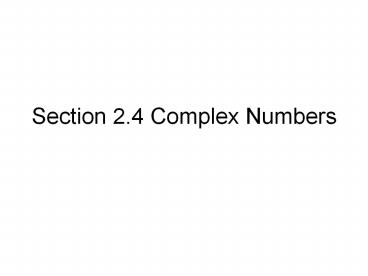Section 2.4 Complex Numbers - PowerPoint PPT Presentation
1 / 30
Title:
Section 2.4 Complex Numbers
Description:
Section 2.4 Complex Numbers What you should learn How to use the imaginary unit i to write complex numbers How to add, subtract, and multiply complex numbers How to ... – PowerPoint PPT presentation
Number of Views:100
Avg rating:3.0/5.0
Title: Section 2.4 Complex Numbers
1
Section 2.4 Complex Numbers
2
What you should learn
- How to use the imaginary unit i to write complex
numbers - How to add, subtract, and multiply complex
numbers - How to use complex conjugates to write the
quotient of two complex numbers in standard form - How to find complex solutions to quadratic
equations
3
Real Number System
- 1, 2, 3, 4,
- How many natural numbers are there?
Natural
4
Real Number System
- 0, 1, 2, 3, 4,
- How many whole numbers are there?
Natural
Whole
5
Real Number System
Natural
- ...-3, -2, -1, 0, 1, 2, 3,
- How many integers numbers are there?
Whole
Integers
6
Real Number System
- Fractions
- How many rational numbers are there?
Natural
Whole
Integers
Rational
7
Real Number System
Natural
- How many irrational numbers are there?
Whole
Integers
Irrational
Rational
8
Real Number System
Natural
- Each set is a subset of the Real Number System.
- The union of all these sets forms the real number
system. - The number line is our model for the real number
system.
Whole
Integers
Irrational
Rational
Real Numbers
9
Definition of Square Root
- If a2 n then a is a square root of n.
- 42 (4)(4) 16
- ? 4 is a square root of 16
- (-4)2 (-4)(-4) 16
- ? -4 is a square root of 16
10
What square root of -16?
- Whatever it is it is not on the real number line.
11
Definition of i
The number i is such that
Imaginary Unit
12
Complex Numbers
Imaginary
REAL
Complex
13
Definition of a Complex Number
- If a and b are real numbers, the number a bi is
a complex number, and it is said to be written in
standard form. - If b 0 then the number a bi a is a real
number. - If b ? 0, then the number a bi is called an
imaginary number. - A number of the form bi, where b ? 0 is called a
pure imaginary number.
14
Examples
15
If you square a radical you get the radicand
2
2
Whenever you have i2 the next turn you will have
-1 and no i.
16
Equality of Complex numbers
- If a bi c di, then a c and b d.
17
Is a negative times a negative always positive?
Trick question. This is not a negative times a
negative.
18
Example
19
Example
20
Example
21
Example
Cancel the i factor
22
Add
Collect like terms.
23
Subtract
First distribute the negative sign.
Now collect like terms.
24
Multiplication
F
O
I
L
25
Simplify each expression. Express your answer in
form.
F-O-I-L
Recall i2-1
Combine like terms.
Combine like terms.
26
Write in the form
2
Multiply by the conjugate factor.
27
Powers of i
Anything other than 0 raised to the 0 is 1.
Anything raised to the 1 is itself.
28
Simplify as much as possible.
29
Use the Quadratic Formula
30
Homework Section 2.4Puzzle































